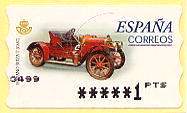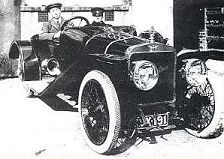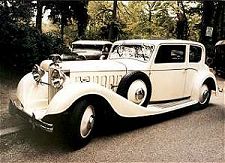| SPAIN.
Epelsa - Mobba issues 2OO1 |
51 |
Coches
de época ( 2 ). HISPANO SUIZA T (CASC)
/
Vintage
cars ( 2 ). HISPANO SUIZA T (CASC) |
 |
|
Date
of issue :
|
|
July 2001
(
1st know date of use : 31.07.01, Phil. Service ) |
|
|
|
47 x 27 mm.
- Format type 2 |
|
Paper
:
|
|
Thermal self
adhesive - multicoloured |
|
Imprint
:
|
|
Thermal on
black |
| Imprint
varieties : |
|
6 ( Mobba
(1)
and Epelsa 4 (1), 5 (2),
6 (2) digits ) |
|
Values
/ Set :
|
|
1
to 999999 PTS / Set
values : 30 - 40 - 75 PTS
( Available printing
varieties and values in the date of issue ) |
|
Design
and Printer :
|
|
 RCM-FNMT.
Real Casa de la Moneda - Fábrica
Nacional de Moneda y Timbre
RCM-FNMT.
Real Casa de la Moneda - Fábrica
Nacional de Moneda y Timbre |
|
Printing
:
|
|
50.000.000
of labels |
|
| Click
on the image to enlarge it |
Second issue of the
ATM set dedicated to the vintage cars.
The July 14th, 1904 a group
of Catalan industrialists headed by Damià Mateu and Francisco
Seix found on Barcelona the society called Hispano
Suiza de Automóviles Sociedad Anónima(
literally ; Hispanic Switzerland cars Company
). The technical Manager was the engineer
Mark Birkigt, who previously
had designed an automobile for the Spanish
car Company La Cuadra, of which they only manufactured
4 units in 1900, and which the precursor of the Hispano Suiza
is considered.
Also
in 1904 they signed the first contracts, one of them to Francisco Abadal,
enthusiastic of these vehicles and that with its sport feats ( as the trip
Barcelona - Paris ) contributed to the introduction of the Hispano
Suiza at international level.
Also the King of Spain D.
Alfonso XIII, great fan of the cars driving, was interested and acquired
the model T-45, a competition car developed for civil use and that
popularly was known as Alfonso XIII. |
 |
 |
Birkigt
develops his ideas of "armoured car", that
in the future will be the common denominator of the Car Company ; This
concept protects the motor underneath closing the chassis, so that the
entrance of water or dust is avoided, simultaneously that gives greater
rigidity to the assembly.
With the years, the Company
reach international prestige and increases the production remarkably ;
new models of automobiles, buses, trucks....
Also a Company branch in
France is created. |
From 1914, with the 1st.
World-wide War, the Hispano Suiza centres its activity in
the manufacture of motors for aviation.
Until 1936 they follow with
the manufacture of vehicles and motors for the aeroplanes Fokker
of the Spanish Postal Airlines ; with the
Spain Civil War the production stops.
With the Decreto
of February 10th, 1940, in that the automotion in Spain was planned, the
INI
( Instituto Nacional de Industria /
Industry
National Institute ) assumes these functions, that will ends with
the creation of ENASA ( Empresa Nacional
de Autocamiones, S.A. / Truck National
Company ) ; the trucks that began to sell under the denomination
of Hispano Suiza gave origin finally to the new Company Pegaso.

Vintage
cars in Spanish philately
|



